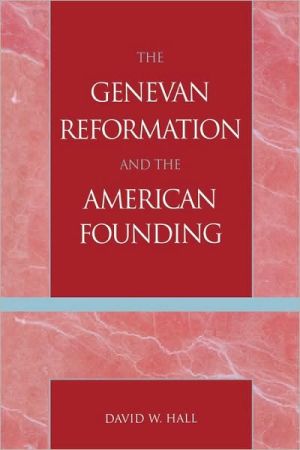

 |

|

The average rating for Genevan Reformation And The American Founding based on 2 reviews is 4.5 stars.
Review # 1 was written on 2016-12-20 00:00:00 Miguel Mendoza Miguel MendozaThis is not an easy read if you like fast-paced and cursory information. (I paced myself over 12 months) But if you pick it up you will learn how the founding of America was based on Calvinistic theology. Dr. Hall starts with the Reformation, particularly in the city of Geneva when John Calvin led the community. He traces the basic tenets of what is called Calvinism (it was not systematized until after Calvin's death) as it spread to England, more dramatically to Scotland and eventually the colonies. The powerful effects of this theology are not commonly discussed but clearly available. 4 of our first five Presidents were considering rebuilding Calvin's College from Geneva in Arlington VA. Not because of his theology but because of how his theology affected political life. From Princeton College, a bastion of Reformation Theology, more than a hundred colonial-period graduates entered public service as judges, senators, congressmen and one president. At the time of the American War of Secession (Independence), more Presbyterian pastors and church leaders were involved in political culture than any other religious group. Hall demonstrates the connection our Founding Documents have with the doctrines of the Reformation. The thousands of citations are painstakingly noted. Regardless of one's position on Calvinism, this book will make a difference in how you view the philosophy and reasoning of the men who founded our country. Reformation theology and its applications permeated 17th and 18th-century American history. |
Review # 2 was written on 2016-05-18 00:00:00 Samson Mfalila Samson MfalilaAn informative and interesting, though not quite riveting, account of a second-rank Reformer whose efforts to unify and animate the church deserve wider respect. Greschat's books is well-researched, and, as the title indicates, it offers a valuable history not only of Bucer himself but the wider theological and political currents of his time. So even for those not zealously interested in Bucer per se, the books still provides a valuable account of the Reformation that considers more than just the big three of Luther, Calvin, and Zwingli. Additionally, Bucer's attempts to build bridges within the Reformation, and also beyond it to the Catholics (truly scandalous to many of his peers) are surprisingly modern in tone and insight. For that reason alone, I think, Bucer would be worth studying. As other reviewers have noted, it's a little odd that Greschat quotes Bucer only sparingly. I'm sorry to say that after finishing the book, I still don't really know what Bucer sounds like, and I don't really know which work(s) of his would be the best place to start. Still, a valuable book and recommended for anyone interested in Reformation history. |
CAN'T FIND WHAT YOU'RE LOOKING FOR? CLICK HERE!!!